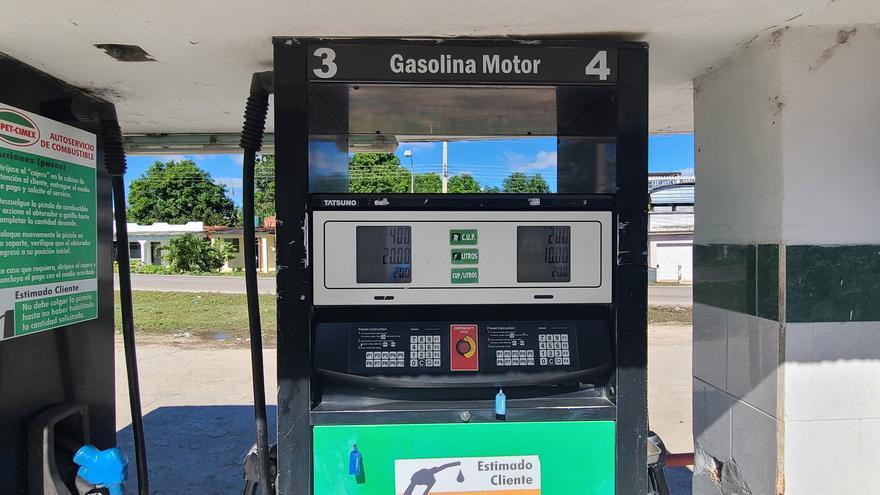
![]() 14ymedio, Pedro Espinosa and Juan Matos, Camajuaní/Manzanillo | 2 January 2024 — The impacts of the new macro-economic readjustment measures that the government announced at the end of the year have yet to be felt at Cuban filling stations. During visits to several of the island’s gas stations, reporters from 14ymedio found that employees of the Cuba Petroleum Union (Cupet) were still waiting for instructions from officials, who have ordered them not to allow customers to take photos of the new prices or the facilities.
14ymedio, Pedro Espinosa and Juan Matos, Camajuaní/Manzanillo | 2 January 2024 — The impacts of the new macro-economic readjustment measures that the government announced at the end of the year have yet to be felt at Cuban filling stations. During visits to several of the island’s gas stations, reporters from 14ymedio found that employees of the Cuba Petroleum Union (Cupet) were still waiting for instructions from officials, who have ordered them not to allow customers to take photos of the new prices or the facilities.
That is the case at a filling station in Camajuaní, a village on the outskirts of Villa Clara. Though the pumps still display the old prices, a company source has confirmed that the cost of a liter of gas will rise from 25 to 250 pesos. The station’s manager is still waiting for confirmation from his bosses before charging the new price. When asked about sales to tourists, he says he is unable to answer the question but refers the reporter to the town’s other gas station, in the direction of Cayería Norte, which is already operating under the new guidelines.
What is clear to the employee is the ban by the local government and police on taking photos of gas pumps. “The DTI (Directorate of Intelligence) chief was just here to pass along that information,” says the worker, casting a sideways glance at the police station located a few yards from the gas station.
The situation is much the same at filling stations in Manzanillo. “Prices haven’t changed but there’s still not much gas to be had,” explains a Cupet employee to a driver at the Celia Sanchez Hospital’s gas station.
Meanwhile, the gas station at the corner of Boyeros and Ayestarán, one of the most important in Havana, had not a single car parked next to its pumps. In addition to the strange absence of a line at the establishment is the lack of employees to answer customers’ questions and concerns. Expectations are that the Cuban government’s economic readjustment plan will be devastating for Cubans but we won’t know until the holiday lull is over.
En un recorrido por varias gasolineras de la Isla, este diario constató que los empleados de la Unión Cuba-Petróleo (Cupet) todavía esperan instrucciones de las autoridades para implementar los nuevos precios del combustible anunciados para este 2024. https://t.co/0oohyMilYr pic.twitter.com/Gq0OLD73DO
— 14ymedio (@14ymedio) January 2, 2024
During visits to several of the island’s gas stations, reporters from 14ymedio found that employees of the Cuba-Petroleum Union (Cupet) were still waiting for instructions from the officials before implementing the new 2024 fuel prices. — 14ymedio
In yet another change in economic direction, Havana announced a series of austerity measures that include a sharp increase in prices for fuel, electricity, water and food.
Government leaders feel some urgency to implement the plan, which they have stressed is not intended to further impoverish the population but rather to make those who spend the most pay more. It is keeping Cubans in suspense, worrying that the package will significantly affect their daily cost of living.
One Cuban economist who has criticized the plan is Pedro Monreal, who claims, “An economic package does not necessarily have to be neo-liberal to have affects similar to those of a traditional neo-liberal package”
Prime Minister Manuel Marrero likened past several years of crisis to a “war economy,” which he claimed is caused by “waste.” This stands in contrast to the dozens of ships loaded with fuel that were seen docked in the nation’s ports in 2023.
Since the plan was announced, the government of Miguel Díaz-Canel has taken pains to point out that it is neither a “neo-liberal* package” nor a “crash program.” This claim, which has been a constant refrain in recent days, is in response to accusations from some in the opposition that these measures are similar to those adopted in recent decades by other, mostly right-wing, governments in the region, including that of the Argentina’s new libertarian president, Javier Milei.
One Cuban economist who has criticized the plan is Pedro Monreal, who claims, “An economic package does not necessarily have to be neo-liberal* to have affects similar to those of a traditional neo-liberal package.”
*Translator’s note: A term used to refer to market-oriented reform policies such as eliminating price controls, deregulating capital markets, lowering trade barriers and reducing — especially through privatization and austerity — state influence in the economy. (Source: Wikipedia)
____________
COLLABORATE WITH OUR WORK: The 14ymedio team is committed to practicing serious journalism that reflects Cuba’s reality in all its depth. Thank you for joining us on this long journey. We invite you to continue supporting us by becoming a member of 14ymedio now. Together we can continue transforming journalism in Cuba.
